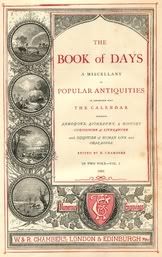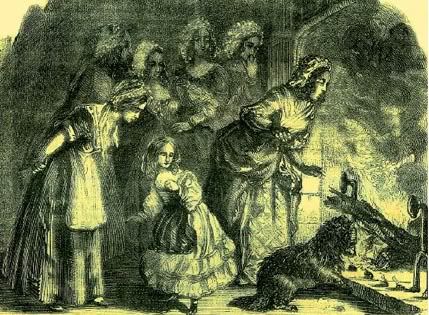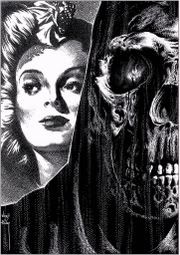 SUPERSTITIONS AND FORTUNES by Elliott O'Donnell -- here is an excerpt from an old antiquarian booky-book about ghosts, folklore and superstition. I thought it would be fun to read some old Victorian muffety-guff from a century ago: "Friday's child is full of woe." Of all days Friday is universally regarded as the most unlucky. According to Soames in his work The Anglo-Saxon Church, Adam and Eve are the forbidden fruit on a Friday and died on a Friday. And since Jesus Christ was crucified on a Friday, it is naturally of small wonder that Friday is accursed.
To travel on Friday is generally deemed to be courting accident; to be married on Friday, courting divorce or death. Few sailors care to embark on Friday; few theatrical managers to produce a new play on Friday. In Livonia most of the inhabitants are so prejudiced against Friday, that they never settle any important business, or conclude a bargain on that day; in some places they do not even dress their children.
For my part, I so far believe in this superstition that I never set out on a journey, or commence any new work on Friday, if I have the option of any other day. . .
SUPERSTITIONS AND FORTUNES by Elliott O'Donnell -- here is an excerpt from an old antiquarian booky-book about ghosts, folklore and superstition. I thought it would be fun to read some old Victorian muffety-guff from a century ago: "Friday's child is full of woe." Of all days Friday is universally regarded as the most unlucky. According to Soames in his work The Anglo-Saxon Church, Adam and Eve are the forbidden fruit on a Friday and died on a Friday. And since Jesus Christ was crucified on a Friday, it is naturally of small wonder that Friday is accursed.
To travel on Friday is generally deemed to be courting accident; to be married on Friday, courting divorce or death. Few sailors care to embark on Friday; few theatrical managers to produce a new play on Friday. In Livonia most of the inhabitants are so prejudiced against Friday, that they never settle any important business, or conclude a bargain on that day; in some places they do not even dress their children.
For my part, I so far believe in this superstition that I never set out on a journey, or commence any new work on Friday, if I have the option of any other day. . .  On All-Hallows E'en the spirits of the dead are supposed to walk. I remember when a child hearing from the lips of a relative how in her girlhood she had screwed up the courage to shut herself in a dark room on All-Hallows E'en and had eaten an apple in front of the mirror; and that instead of seeing the face of her future husband peering over her shoulder, she had seen a quantity of earth falling. She was informed that this was a prognostication of death and, surely enough, within the year her father died. I have heard, too, of a girl who, on All-Hallows E'en, walked down a gloomy garden path scattering hempseed for her future lover to pick up, and on hearing someone tiptoeing behind her, and fancying it was a practical joker, turned sharply round, to confront a skeleton dressed exactly similar to herself. She died before the year was out from the result of an accident on the ice.
I have often poured boiling lead into water on All-Hallows E'en and it has assumed strange shapes, once -- a boot, once -- a coffin, once -- a ship.
On New Year's Eve a certain family, with whom I am very intimately acquainted, frequently see ghosts of the future, as well as phantasms of the dead, and, when I stay with them, which I often do at Christmas, I am always glad when this night is over. . .
The 28th of December, Childermass Day, or the Feast of the Holy Innocents, the day on which King Herod slaughtered so many infants (if they were no better mannered than the bulk of the County Council children of to-day, once can hardly blame him), is held to be unpropitious for the commencement of any new undertaking by those of tender years.
The fishermen who dwell on the Baltic seldom use their nets between All Saints and St. Martin's Day, or on St. Blaise's Day; if they did, they believe they would not take any fish for a whole year. On Ash Wednesday the women in those parts neither sew nor knit for fear of bringing misfortune upon their cattle, whilst they do not use fire on St. Lawrence's Day, in order to secure themselves against fire for the rest of the year.
In Moravia the peasants used not to hunt on St. Mark's or St. Catherine's Day,
On All-Hallows E'en the spirits of the dead are supposed to walk. I remember when a child hearing from the lips of a relative how in her girlhood she had screwed up the courage to shut herself in a dark room on All-Hallows E'en and had eaten an apple in front of the mirror; and that instead of seeing the face of her future husband peering over her shoulder, she had seen a quantity of earth falling. She was informed that this was a prognostication of death and, surely enough, within the year her father died. I have heard, too, of a girl who, on All-Hallows E'en, walked down a gloomy garden path scattering hempseed for her future lover to pick up, and on hearing someone tiptoeing behind her, and fancying it was a practical joker, turned sharply round, to confront a skeleton dressed exactly similar to herself. She died before the year was out from the result of an accident on the ice.
I have often poured boiling lead into water on All-Hallows E'en and it has assumed strange shapes, once -- a boot, once -- a coffin, once -- a ship.
On New Year's Eve a certain family, with whom I am very intimately acquainted, frequently see ghosts of the future, as well as phantasms of the dead, and, when I stay with them, which I often do at Christmas, I am always glad when this night is over. . .
The 28th of December, Childermass Day, or the Feast of the Holy Innocents, the day on which King Herod slaughtered so many infants (if they were no better mannered than the bulk of the County Council children of to-day, once can hardly blame him), is held to be unpropitious for the commencement of any new undertaking by those of tender years.
The fishermen who dwell on the Baltic seldom use their nets between All Saints and St. Martin's Day, or on St. Blaise's Day; if they did, they believe they would not take any fish for a whole year. On Ash Wednesday the women in those parts neither sew nor knit for fear of bringing misfortune upon their cattle, whilst they do not use fire on St. Lawrence's Day, in order to secure themselves against fire for the rest of the year.
In Moravia the peasants used not to hunt on St. Mark's or St. Catherine's Day,  for fear they should be unlucky all the rest of the year. In Yorkshire it was once customary to watch for the dead on St. Mark's (April 24) and Midsummer Eve. On both those nights (so says Mr. Timbs in his Mysteries of Life and Futurity) persons whould sit and watch in the church porch from eleven o'clock at night till one in the morning. In the third year (for it must de done thrice), the watchers were said to see the spectres of all those who were to die the next year pass into the church.
for fear they should be unlucky all the rest of the year. In Yorkshire it was once customary to watch for the dead on St. Mark's (April 24) and Midsummer Eve. On both those nights (so says Mr. Timbs in his Mysteries of Life and Futurity) persons whould sit and watch in the church porch from eleven o'clock at night till one in the morning. In the third year (for it must de done thrice), the watchers were said to see the spectres of all those who were to die the next year pass into the church. I am quite sure there is much truth in this, for I have heard of sceptics putting it to the test, and of "singing to quite a different tune" when the phantasms of those they knew quite well suddenly shot up from the ground, and, gliding past them, vanished at the threshold of the church.
I am quite sure there is much truth in this, for I have heard of sceptics putting it to the test, and of "singing to quite a different tune" when the phantasms of those they knew quite well suddenly shot up from the ground, and, gliding past them, vanished at the threshold of the church. Occassionally, too, I have been informed of cases where the watchers have seen themselves in the ghastly procession and have died shortly afterwards.

No comments:
Post a Comment